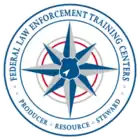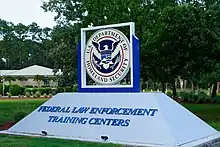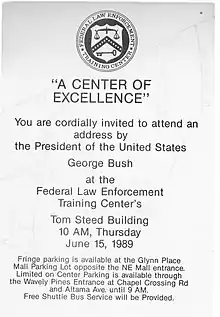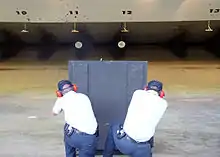Federal Law Enforcement Training Centers
The Federal Law Enforcement Training Centers (FLETC)[2] serves as an interagency law enforcement training body for 105 United States government federal law enforcement agencies.[3] The stated mission of FLETC is to "...train those who protect our homeland". Through the Rural Policing Institute (RPI) and the Office of State and Local Training, it provides tuition-free and low-cost training to state, local, campus and tribal law enforcement agencies.[4]
 Seal | |
 Entrance to FLETC Headquarters | |
| Agency overview | |
|---|---|
| Formed | July 1, 1970 |
| Jurisdiction | Federal government of the United States |
| Headquarters | Glynco, Georgia 31°14′02″N 81°28′08″W |
| Employees | 1,068 |
| Annual budget | US$242 million (2017) |
| Agency executive |
|
| Parent department | U.S. Department of Homeland Security |
| Website | fletc |
History

Studies conducted in the late 1960s revealed an urgent need for training by professional instructors using modern training facilities and standardized course content. Congress authorized funds for planning and constructing the Consolidated Federal Law Enforcement Training Center (CFLETC). In 1970, the CFLETC was established as a bureau of the U.S. Department of the Treasury (Treasury Order #217) and began training operations in temporary facilities in Washington, D.C.[5]
The permanent location of the center was originally planned for the Washington, D.C., area. However, a three-year construction delay resulted in Congress requesting that surplus federal installations be surveyed to determine if one could serve as the permanent site. In May 1975, after a review of existing facilities, the former Naval Air Station Glynco was selected. In the summer of 1975, the newly renamed Federal Law Enforcement Training Center (FLETC) relocated from Washington, D.C., and began training in September of that year at Glynco, Georgia. Glynco is the headquarters site and main campus for the FLETC and houses the senior leadership of the organization.[5]
On March 1, 2003, FLETC formally transferred from the Treasury Department to the newly established U.S. Department of Homeland Security (DHS), along with some 22 other federal agencies and entities. The move reflected the centrality of the FLETC's mission in support of the unified homeland security effort.
Headquarters
The FLETC headquarters are at the former Naval Air Station Glynco in the Glynco area of unincorporated Glynn County, Georgia, near the port city of Brunswick, Georgia, and about halfway between Savannah, Georgia, and Jacksonville, Florida.[6] Additionally, it operates two other residential training sites at Artesia, New Mexico, and in Charleston, South Carolina. It also operates an in-service re-qualification training facility in Cheltenham, Maryland, for use by agencies with large concentrations of personnel in the Washington, D.C., area. The FLETC Orlando team located at Naval Air Warfare Center Training Systems Division in Orlando, Florida trains with branches of the United States Armed Forces evaluating new and existing training technologies for their ability to meet law enforcement training needs. The Los Angeles Regional Maritime Law Enforcement Training Center in Los Angeles, California has worked a partnership with FLETC along with the Los Angeles County Sheriff's Department along with state and local agencies to develop comprehensive maritime training. FLETC has oversight and program management responsibilities for the International Law Enforcement Academies (ILEA) in Gaborone, Botswana, San Salvador, El Salvador, and Lima, Peru. It also supports training at ILEAs in Budapest, Hungary, and Bangkok, Thailand.
Parent department
The FLETC's parent department, the DHS, supervises its administrative and financial activities. As an interagency training organization, FLETC has professionals from diverse backgrounds to serve on its faculty and staff. Approximately one-third of the instructor staff are permanent FLETC employees. The remainder are federal officers and investigators on short-term assignment from their parent organizations. Agencies take part in curriculum review and development conferences and help develop policies and directives.
Affiliations

Partner organizations have input regarding training issues and functional aspects of the Center. The current partner organizations are:[7]
- Administrative Office of the United States Courts
- Amtrak (National Railroad Passenger Corporation)
- Office of Inspector General
- Police Department
- Central Intelligence Agency
- The Directorate of Digital Innovation
- The Directorate of Analysis
- The Directorate of Operations
- The Directorate of Support
- The Directorate of Science and Technology
- Executive Office
- Department of Agriculture
- Animal Plant Health Inspection Services
- Food Safety Inspection Service
- Office of the Inspector General
- United States Forest Service
- Department of Commerce
- Department of Defense
- Department of the Air Force
- Department of the Army
- Army Criminal Investigation Command
- Army Counterintelligence Command
- Department of the Navy
- Defense Intelligence Agency
- Defense Logistics Agency
- National Geospatial-Intelligence Agency
- National Security Agency
- Office of Inspector General
- Pentagon Force Protection Agency
- Department of Education
- Office of the Inspector General
- Department of Energy
- National Nuclear Security Administration - Office of Secure Transportation
- Office of Health, Safety and Security
- Office of Inspector General
- Department of Health and Human Services
- Center for Disease Control and Prevention – Office of Safety, Security and Asset Management
- Food and Drug Administration - Office of Criminal Investigations
- National Institute of Health
- Office of the Inspector General
- Department of Homeland Security
- Customs and Border Protection
- Immigration & Customs Enforcement
- Enforcement and Removal Operations
- Federal Emergency Management Agency - Office of Security
- Federal Protective Service
- Homeland Security Investigations
- Intelligence Analysis Operations
- Office of Inspector General
- Office of Professional Responsibility
- Transportation Security Administration
- United States Secret Service
- United States Citizenship and Immigration Services
- United States Coast Guard
- Coast Guard Investigative Service
- Marine Law Enforcement Academy
- Department of Housing and Urban Development
- Office of the Inspector General
- Protective Services Division
- Department of Interior
- Bureau of Indian Affairs
- Bureau of Land Management
- Bureau of Reclamation
- Office of Inspector General
- Office of Law Enforcement and Security
- Office of Surface Mining Reclamation and Enforcement
- National Park Service
- United States Fish and Wildlife Service
- Law Enforcement
- Refuge
- Department of Justice
- Department of Labor
- Office of Inspector General
- Office of Labor-Management Standards
- Department of State
- Diplomatic Security Service
- Office of Inspector General
- United States Agency for International Development - Office of Inspector General
- Department of Transportation
- Office of Inspector General
- Federal Aviation Administration
- Department of the Treasury
- Bureau of Engraving and Printing
- Financial Crimes Enforcement Network
- Internal Revenue Service, Criminal Investigation
- Office of Terrorism and Financial Intelligence - Office of Foreign Assets Control
- Office of the Inspector General
- Treasury Inspector General for Tax Administration
- United States Mint
- Department of Veterans Affairs
- Law Enforcement Training Center
- Office of the Inspector General
- Environmental Protection Agency
- Criminal Investigation Division
- Office of the Inspector General
- Federal Deposit Insurance Corporation - Office of the Inspector General
- Federal Reserve System
- General Services Administration - Office of the Inspector General
- Government Publishing Office
- Office of the Inspector General
- Security Services
- National Aeronautics and Space Administration - Office of the Inspector General
- Nuclear Regulatory Commission
- Office of the Inspector General
- Office of Personnel Management
- Office of the Inspector General
- Railroad Retirement Board - Office of the Inspector General
- Small Business Administration
- Office of the Inspector General
- Smithsonian Institution
- National Zoological Park Police
- Office of Protective Services
- Social Security Administration
- Office of the Inspector General
- Tennessee Valley Authority
- Office of the Inspector General
- Police Department
- United States Capitol Police
- United States Postal Service
- Office of the Inspector General
- United States Supreme Court Police
See also
References
- "Our Leadership". FLETC. Retrieved 8 March 2018.
- "FLETC Rural Policing Institute". Federal Law Enforcement Training Centers. Retrieved 2022-03-10.
- "Welcome to FLETC". Federal Law Enforcement Training Centers. Retrieved 17 January 2018.
- "DHS FY 2017 Budget-in-Brief" (PDF).
- "FLETC History - FLETC". www.fletc.gov. Retrieved 17 January 2018.
- "Glynco, Georgia - FLETC". www.fletc.gov. Retrieved 17 January 2018.
- "Current Participating Organizations | Federal Law Enforcement Training Centers". www.fletc.gov. Retrieved 2021-01-09.
- Attribution
![]() This article incorporates public domain material from websites or documents of the United States Department of Homeland Security.
This article incorporates public domain material from websites or documents of the United States Department of Homeland Security.
Further reading
- Public Manager. Spring 2013, Vol. 42, Issue 1, pp. 15–19.
- Vital Speeches of the Day. December 2010, Vol. 76, Issue 12, pp. 556–558.
- Journal of Applied Security Research. 2012, Vol. 7 Issue 4, pp. 478–488.
- U.S. News Digital Weekly. 4/4/2014, Vol. 6 Issue 14, pp. 15.
